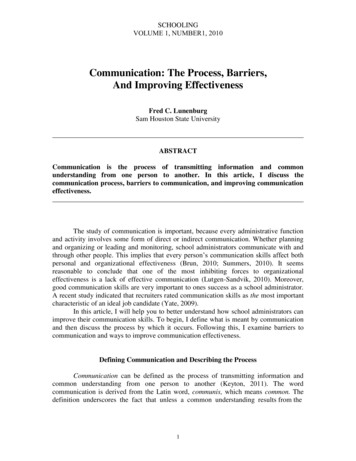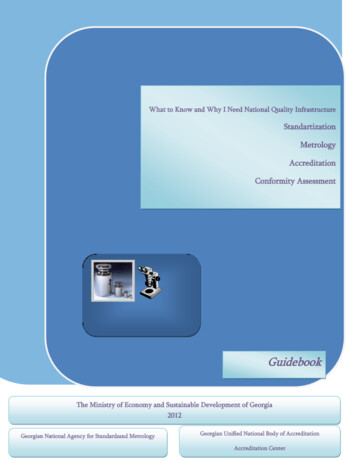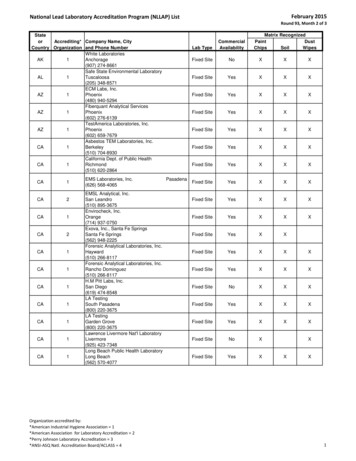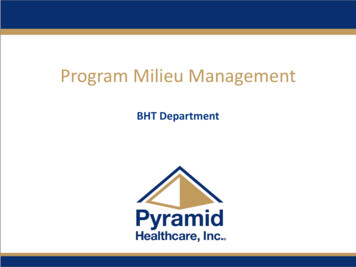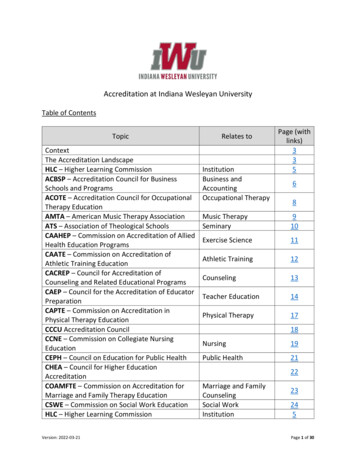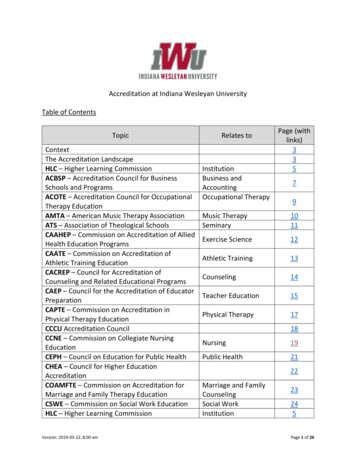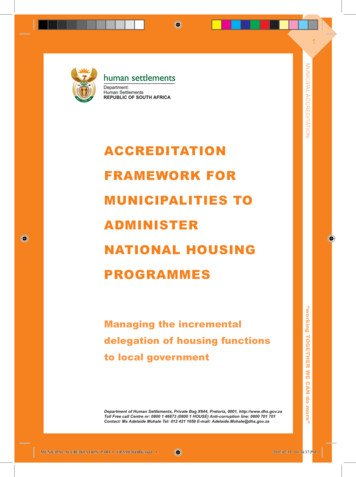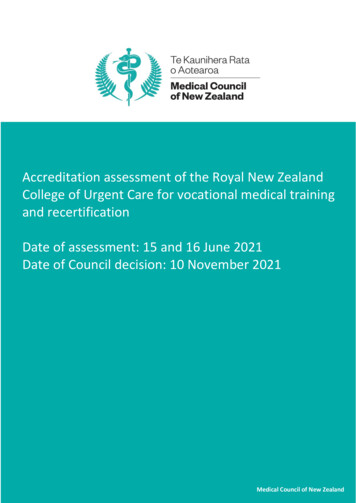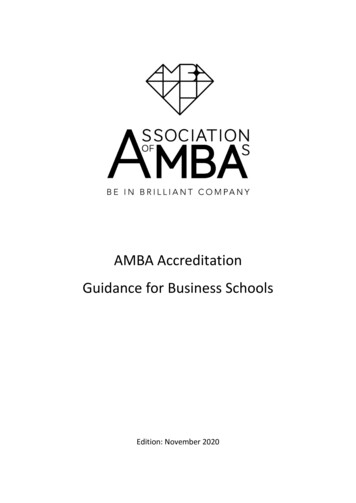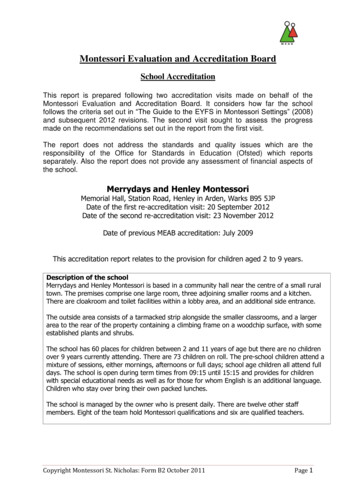
Transcription
Understanding Barriers to Accreditation inthe Food & Drink Sector in WalesDECK TWO: Report FindingsA report by the ZERO”FIVE Food Industry Centre at Cardiff Metropolitan University for theWelsh Government Food Division as part of Lot 9: Programmes to Support the Food & DrinkSector.Project Manager:Susie AbsonProject Team:Leanne Ellis, Ellen Evans, Jessica Lacey and Helen TaylorReport Prepared By:Dr Ellen W. EvansContributors:Jackie Evans, Anne-Marie Flynn, Ffion Hewson, Janet Holmes, DavidLloyd, Jamie Old, Katie Pressdee, Bethan Rowlands and Ginnie Winter.
Understanding Barriers to Accreditation in the Food & Drink Sector in WalesJune 20161. Introduction1.1 The need for food safety schemesFood Safety Schemes (FSSs) are essential to the food and drink industry. FSSs provide theframework for compliance within the industry to assist in the production of safe and legalfood. FSSs are differentiated by having their own criteria for food safety, quality andoperational control. FSSs aim to fulfil legal compliance and maintain both brand andconsumer protection.The leading FSSs aim to define the standards that Food and Drink Manufacturing andProcessing Businesses (FDMPBs) should meet. Over time, these schemes intend to raisestandards to improve the overall performance of the entire food and drink industry.Globalisation of food supply means that compliance with a privately operated FSS is often aprerequisite to supply. These schemes are produced by stakeholders such as the BritishRetail Consortium (BRC) (Manning & Baines, 2004).A trend has been observed over the last 15 years which suggests that a number ofFDMPBs in the UK, have moved away from generic ISO certification towards bespoke 3 rdParty accreditation standards, such alternative 3rd Party accreditation schemes are said tohave been developed in a response to the need for such standards to closely match therequirements of the industry and the need to rationalise retailer-specific complianceschemes (Grigg & McAlinden, 2001).One of the key market drivers in the level of penetration of FSSs is the retailer’s need tomeet their due diligence requirements. There is also an added business benefit in reducingthe cost of the retailers own involvement in the inspection of their immediate suppliers andprevious suppliers in the food supply chain (Manning & Baines, 2004).Indeed, Manning (2007) outlines that the three key stakeholder drivers are legislation, thedevelopment of private Food Safety Management Systems (FSMS) and the protection ofthe product brand. Furthermore, it is discussed that effective FSMS must be at the core oforganisational strategy.Swoffer (2005) describes a ‘retail revolution’ in the UK, in which UK retailers are the maindrivers of the development of FSMS in Europe, they have been proactively involved withthe development of FSMS such as Assured Farm Schemes, GlobalGAP and the BRCGlobal Standard for Food Safety, it is said that these Standards have become widespreadin use and have been used as the framework for other Standards (Swoffer, 2005).There are several key factors that have resulted in the proliferation and evolution of privateFSS standards. Key factors include continued reforms in FSSs (as a response to realand/or perceived risks, and the need to include more stringent requirements), a greateremphasis on control of the processes by which food is brought to market and a greateremphasis on the responsibility of private sector FDMPBs in ensuring that food is safe forconsumers. The Elliott Review into the integrity and assurance of food supply networks inthe UK recommended that the value of audit and assurance regimes must be recognised inidentifying the risk of food crime in supply chains (Elliott, 2014).Globalisation of food supply and the increased trend towards privatisation of marketgovernance are all key factors in the increase in private FSSs (Henson & Humphrey, 2009).Holleran et al. (1999) separate FSMS into three groups, these are: International standards (ISO 9000);National assurance standards (line marks, assured produce), andProprietary quality assurance systems (defined by retailers and stakeholders, suchas BRC Global Standards).1
Understanding Barriers to Accreditation in the Food & Drink Sector in WalesJune 2016It is suggested that there is a need to develop a consistent set of reliable and validmeasures to explore perceived barriers and benefits from the implementation of 3rd Partycertified FSMS (Qijun & Batt, 2016). Research suggests that FDMPBs with limitedknowledge of the process of FSMS certification are largely unaware of the high costs andpaperwork required to obtain certification (Qijun & Batt, 2016).Research conducted in the USA determined that the most common reasons for becomingcompliant was to meet customers' requirements. Enhancing food safety and remainingcompetitive were other reasons given for becoming compliant (Crandall et al., 2012),however given that such data on UK FDMPBs and particularly those in Wales are limited,there is a need for research with FDMPBs in Wales to identify the driver, barriers andbenefits of FSS compliance.1.2 Welsh Government Action Plan for the Food and Drink Industry 2014-2020The Welsh Government Action Plan for the Food and Drink Industry 2014-2020 (WelshGovernment, 2014) demonstrates a clear commitment to promote and support the uptakeof recognised FSSs of food, drink and feed businesses in Wales. There is limited UK datadetailing the factors associated with obtaining compliance to FSSs, for this reason, there isa need to obtain an in-depth understanding of the barriers that exist to FDMPBs in Wales toobtaining and maintaining FSSs. Such data may inform the development of supportmechanisms to enable increased accreditation and accelerate food sector growth in linewith Welsh Government aspirations (Evans et al., 2016).2. Research aims and objectives2.1 Research aimsThe aims of this research project are to: Assess what food and drink FSSs are available for FDMPBs in WalesProvide details about the breadth of these schemes and their credibilityObtain an understanding of what the market place requires and how the sector isdeveloping the future of FSSsTo provide an update on the uptake of FSSs (including BRC Global Standards andSALSA Standard);Identify and understand the barriers for Welsh FDMPBs achieving accreditations(such as BRC Global Standard/SALSA Standard or similar). Understand the schemerequirements to supply retailers, the public sector and other markets.Gain an understanding of how to support Welsh FDMPBs to gain 3rd partyaccreditation/certification to enable access to new market opportunities and achievegrowth in line with the Food and Drink Action Plan targets.2.2 Research objectives Conduct a desk-based review of available FSSs and to evaluate how robust,respected, credible and practical each FSS is;Undertake focus groups with FDMPBs and stakeholders to determine the barrierswhich prevent FDMPBs in Wales gaining FSSs compliance;Utilise quantitative research methods to inform the development of supportmechanism recommendations; andPresent recommendations to support and enable FDMPBs in Wales to overcome thebarriers to FSS compliance.2
Understanding Barriers to Accreditation in the Food & Drink Sector in WalesJune 20163. Evaluation of available FSSsA panel of qualified food science technologists (FST) (n 7) identified specific characteristicsto assess scheme practicality, credibility, respectability and robustness. The researchidentified 30 FSSs currently implemented in the UK (particularly in Wales), which included;1. BRC Global Standard for Food Safety,2. BRC Global Standard for Food Safety (Global Markets Standard),3. BRC Global Standard for Packaging and Packaging Materials,4. BRC Global Standard for Storage & Distribution,5. BRC Global Standard for Agents and Brokers,6. SALSA Standard,7. STS Public Sector Code of Practice,8. Lion Code (BEIC),9. Organic Standard,10. Red Tractor Standard,11. Marks & Spencer Retail Standard,12. Waitrose Retail Standard,13. Tesco Retail Standard,14. Tesco Nurture Retail Standard,15. ASDA Retail Standard,16. Sainsbury’s Retail Standard,17. Lidl Retail Standard,18. Aldi Retail Standard,19. Food Hygiene Rating Scheme (FHRS),20. Local Authority Supplier Audit,21. Protected Geographical Indication Scheme (PGI),22. Gluten Free Audit Standard (Coeliac UK),23. Fair Trade Standard,24. Automatic Vending Association (AVA),25. KOSHER Certification,26. International Organisation for Standardisation (ISO) 9001 Standard,27. Food Safety System Certification (FSSC) 22000 Standard,28. International Food Standard (IFS),29. Roundtable on Sustainable Palm Oil Standard (RSPO); and30. Safe, Quality Food Code (SQF).Furthermore, the FST panel identified four FSSs most pertinent to FDMPBs in Wales asthey enable access to different markets including retail, wholesale and public sector, andinclude a FSS that is mandatory in Wales. The findings relating to these four schemes arepresented in tables in each section and include;1. BRC Global Standard for Food Safety (Worldwide FSS),2. SALSA Standard (UK-only FSS),3. Food Hygiene Rating Scheme (FHRS) (Mandatory for food and drink premises inWales since 2013. Currently voluntary in England and Northern Ireland. In Scotland,the Food Hygiene Information Scheme (FHIS) applies.FHRSextends to allestablishments supplying food direct to consumers (restaurants, cafes, takeaways,sandwich shops and retailers)); and4. STS Public Sector Code of Practice (Mandatory food safety requirements forprocessors and suppliers to the public sector).3
Understanding Barriers to Accreditation in the Food & Drink Sector in WalesJune 20163.1 FSSs available to FDMPBsThe availability of different FSSs across Wales is vast, with relevant schemes being offeredthroughout the food chain. Since 1990, recognised as an era of high profile internationalfood crisis, the review identified the launch of at least 17 new FSSs within the market placesince the 1990s.FSSs in the review (%)The majority of FSSs available (93%) are targeted specifically to food and drink processorsand manufacturers. The availability of FSSs within the remaining supply chain remainsmore limited. Figure 1 illustrates the total number of FSSs within the study for each targetFDMPB type. It should be noted, some FSSs are targeted to more than one part of the foodand drink BssupplyingretailFarmersFood ServiceCo-packersFood storage WholesalersanddistributionbusinessesAgents &BrokersTarget food and drink sectorFigure 1 Percentage of FSSs included in the review based on target sector.The research identified that in 2014, the BRC launched a new FSS specifically for agentsand brokers. This was in line with the Elliott Review findings following a food fraud incidentin 2013.The Global Standard for Agents and Brokers provides certification for FDMPBs that providepurchase, importation or product distribution services in the food and packaging supplychain (BRC, 2014). The importance of agents and brokers in the food chain is oftenoverlooked. Agents and brokers provide a critical link in the movement and trade ofproducts, and influence supplier product safety and quality standards, as well as beingresponsible for maintaining an effective chain of traceability (BRC, 2014).Agents and brokers are unique in that they do not manufacture, store or distribute productsthemselves but facilitate this through the use of third parties. The end user therefore, haslimited knowledge of the movement of the goods they are purchasing, traceability throughthe chain or even the original source. The launch of the BRC Standard for Agents andBrokers marks the first of its kind and highlights the growing need to have an effective andtransparent supply chain management system which ensures global food security.3.2 FSS PracticalityThe characteristics considered under this section relate to the practical considerations of
Understanding Barriers to Accreditation in the Food & Drink Sector in Wales DECK TWO: Report Findings A report by the ZERO"FIVE Food Industry Centre at Cardiff Metropolitan University for the Welsh Government Food Division as part of Lot 9: Programmes to Support the Food & Drink Sector. Project Manager: Susie Abson
